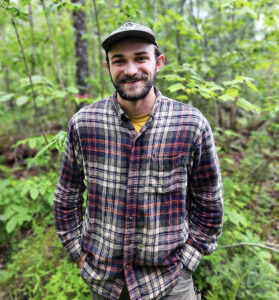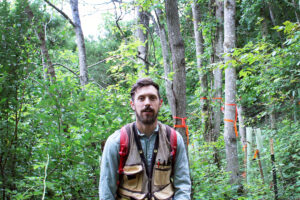By Art Kabelowsky, DNR Outreach and Communications
Arthur.Kabelowsky@wisconsin.gov or 608-335-0167
It’s time for River Mathieu and Tim Shively to put all their education and research to work.
Mathieu and Shively are the newest additions to the Wisconsin Department of Natural Resources (DNR) Forest Health team. Both started on June 30, filling Forest Health Specialist vacancies.
Mathieu will take over the South Central zone and will be based in the Fitchburg Service Center. He replaces Mike Hillstrom, who transferred earlier this year to become the DNR Invasive Forest Pest Coordinator. Mathieu can be reached at River.Mathieu@wisconsin.gov. He will be responsible for the following counties: Columbia, Crawford, Dane, Dodge, Grant, Green, Iowa, Jefferson, Lafayette, Richland, Rock, Sauk, Vernon and Walworth.
Shively is the new specialist for the West Central zone, replacing Todd Lanigan, who retired in 2022. He will be based in the Eau Claire Service Center and can be reached at Timothy.Shively@wisconsin.gov. Shively will be responsible for the following counties: Buffalo, Chippewa, Clark, Dunn, Eau Claire, Jackson, Juneau, La Crosse, Monroe, Pepin, Pierce, St. Croix and Trempealeau.

River Mathieu, a graduate of St. Lawrence University and Michigan State University, joined the Wisconsin Department of Natural Resources on June 30 as Forest Health specialist for South Central Wisconsin.
Mathieu: Love For The Woods
In June, Mathieu defended his master’s thesis at Michigan State University. His research involved the ecological impacts of emerald ash borer (EAB) on black ash forests in Michigan, focusing on the potential for young black ash trees to grow following the death of mature black ash due to EAB.
“We looked at regeneration dynamics, seeing how EAB interacts with the orphan cohort of black ash trees,” Mathieu said. “We were trying to see if there’s hope that those trees might be able to grow once the overstory canopy is killed.”
Mathieu grew up working on a farm in Canterbury, New Hampshire, and received an undergraduate degree in Environmental Studies and Biology at St. Lawrence University.
He also worked as a pathways intern for the United States Forest Service in Durham, New Hampshire, working with a team of forest health researchers who studied forest insect pests and diseases – mainly EAB and spongy moth – and that sparked his interest in forest entomology and the role insects play in forest ecosystems.
“I always wanted a career where I’d be able to be outside, in the woods. I grew up in a small town surrounded by woods, and I spent as much time as I could out there,” Mathieu said.
“I’ve been kind of cooped up in the lab for the last eight months, writing and doing data analysis,” Mathieu said. “I’m excited about this position … (and) excited to be outside and in the woods again, this time to explore new forests.”

Tim Shively has been named Forest Health Specialist for the West Central zone by the Wisconsin Department of Natural Resources.
Shively: From The Army To The Woods
Shively grew up in Indianapolis and earned an appointment to the United States Military Academy, where he received a Bachelor of Science degree. He served in the United States Army from 2010 to 2018, including time in Afghanistan, and later became a brigade assistant operations officer at Fort Drum, N.Y.
All along, though, Shively knew he would eventually follow a career path that took him into nature. “Finding a career in the outdoors was really what drew me in this direction.”
Shively earned a master’s degree in the Forestry program at North Carolina State University.
“I didn’t know much about forest health until I took a class and discovered I was really interested in it,” Shively said. “Until then, I had been thinking about a more general path, such as forestry and land management, but I got interested in forest health.”
Shively became an assistant to Drs. Scott Salom and Jacob Barney of the Virginia Tech Department of Entomology. He was named a Tillman Scholar by the Pat Tillman Foundation in 2022 after his first year as a Ph.D. student and went on to complete his Ph.D. work in Plant Pathology, Physiology and Weed Science in May.
Shively’s dissertation was on tree-of-heaven management using a fungal pathogen as a biocontrol. “The fungus … displayed high levels of virulence on tree-of-heaven,” he said. “It has to be approved by the United States Department of Agriculture Animal and Plant Health Inspection Service and the Environmental Protection Agency before it can become widely available as a biocontrol agent.”
The doctorate degree didn’t mark the end of Shively’s learning process, though. “It’s definitely different enough here (in Wisconsin) that I have some things to learn,” he said. “I already have a book and have been studying up on the different tree species.
“There’s more difference in the forest types and the tree species, and which invasive species are more prevalent,” Shively said. “For invasive pests, it’s very similar.”
